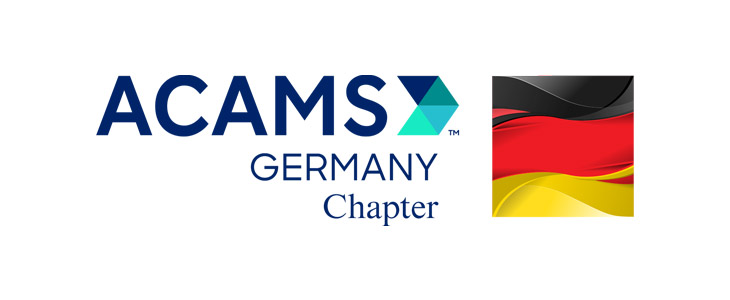
Despite the COVID-19 pandemic, the ACAMS Germany Chapter engaged with its members throughout 2020 via six virtual events and wrapped up with a Zoom Christmas party.
Although the personal interactions and in-person meetings were missed, the ACAMS Germany Chapter managed to increase its reach and had many more participants at its online events than it might have had during a live session. This was partly due to the relevance of the topics covered, which went beyond Germany and because some of the events were hosted in English. Thus, the constraints of COVID-19 taught the chapter additional and complementary formats to host chapter events.
The ACAMS Germany Chapter kick-started the year with an event on the latest regulatory developments, such as the adapted German anti-money laundering (AML) legislation reflecting the Fifth AML Directive (5AMLD). Other events touched upon the passing of the ‘Directive of the European Parliament and of the Council on combating money laundering by criminal law’,1 leading to discussions on a variety of topics including the real estate sector and the challenges facing real estate companies and notaries as a result of the evolving regulatory landscape.
Besides their exposure to financial crime, virtual assets have also come into focus for being a method for terrorist financing. The results of an in-depth study published by the Counter Extremism Project (CEP) and authored by Berlin Risk were presented during a chapter event followed by a panel discussion with industry experts who touched upon the Financial Action Task Force’s (FATF) approach to managing AML and counter-terrorist financing risks attached to virtual assets, the EU’s regulatory framework for this new asset class, the ongoing consultation processes in the EU and how it will most likely shape the regulatory framework for cryptocurrencies going forward.
Another important topic discussed during a separate event in October was the status of sanctions risks. With sanctions experts from the US, the current reality around sanctions enforcement, US export controls and possible trends ahead were discussed.
On the same day that ACAMS’ wildlife trafficking certificate was launched, the chapter welcomed Amanda Gore, an investigator specialised in environmental crimes, who presented the results of her extensive research across Africa, Asia and Eastern Europe. Through a series of case studies on wildlife crime, she shared her insights into the associated payment methods and illicit financial flows linked to environmental and particularly to wildlife trafficking.
Another event discussed public-private partnerships and a utility model reflecting a project from the Netherlands. The five largest banks in the Netherlands―ING, Rabobank, ABN AMRO, Triodos Bank and De Volksbank―formally established the Transaction Monitoring Netherlands (TMNL), a first of its kind mechanism for jointly monitoring transactions. The experts discussed how the joint utility will allow Dutch partner banks to run transaction monitoring alerts over almost the entire retail banking network and consolidate their AML efforts more effectively.
The release of the national risk assessment drew attention to the potential risk of AML in the investment fund sector. AML and investment fund experts discussed the specific challenges faced by the sector in their attempt to implement an AML program, undertake risk-based know your customer (KYC) procedures, and monitor funds undergoing AML risk exposure, in relation to investors, co-investors and their portfolio companies. Besides an overview of the regulatory requirements, the experts shared case studies and industry best practices.
A big thanks goes out to ACAMS Germany Chapter sponsors KPMG, CEP, PwC, Deloitte, ALL AML and FTI as well as the following speakers who joined and supported the events:
- Ilka Brian, head of global standards AML, Commerzbank
- Jeannette Fleißner, deputy money laundering reporting officer, IKB Deutsche Industriebank
- Mehmet Aydogdu, head of AML, China Construction Bank
- Daniel Thelesklaf, former director, FIU Switzerland
- Dr. Hans-Jakob Schindler, senior director, CEP
- Dr. Daniel Eisermann, senior partner, Berlin Risk
- Lars-Heiko Kruse, partner, PwC
- Tommas Kaplan, head of compliance, Poll Immobilien
- Amanda Gore, founder and managing director, Centre for Global Advancement
- Jim Huish, managing director, FTI
- Amber Vitale, managing director, FTI
- Steve Wilcox, senior director, FTI
- Dr. Carsten Giersch, managing director, ALL AML
- Joel El-Qalqili, LL.M., senior associate, SMP
- Aleksandra Zorylo, operating partner, Point Nine Capital
- Sandra Kumhofer, general counsel, RealPort AG
- Jeroen Rijpkema, program manager and acting managing director, Nederland B.V.
- Thorsten Höche, managing director, Association of German Banks
- Baldwin Kramer, partner, Deloitte
- Sebastian Glaab, head of AML/Compliance, VTB Bank
For additional information on Germany Chapter events, membership details and upcoming events, please visit the chapter’s page: http://www.acams.org/acams-chapters/germany.
To reach the chapter directly, email germanychapter@acams.org. In addition, an overview of Germany Chapter activities since 2016 can be found at: http://www.acams.org/acams-chapters/germany.
Jennifer Hanley-Giersch, CAMS-Audit, managing partner, Berlin Risk Advisors GmbH, Berlin, Germany, jennifer.hanley@berlinrisk.com
- “Directive ED 2018/ of the European Parliament and of the Council the European Union on combating money laundering by criminal law,” The European Parliament, 19 September 2018, https://data.consilium.europa.eu/doc/document/PE-30-2018-INIT/en/pdf










